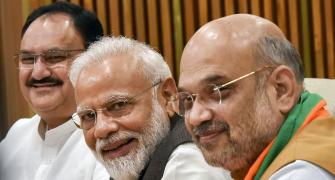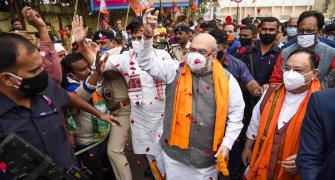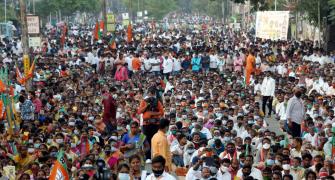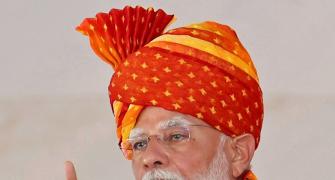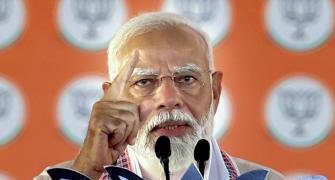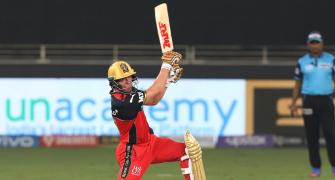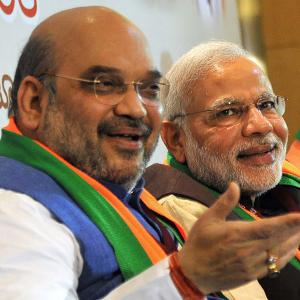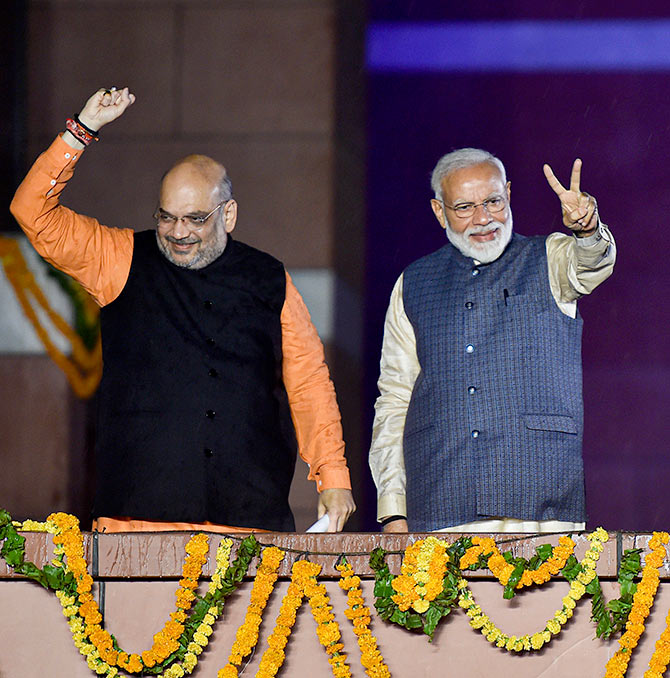The accent on 'making the south feel wanted' was the reason why P Muralidhar Rao, who was dropped as general secretary, was partially reinstated in the central apparatus as prabhari in charge of Madhya Pradesh.
'Pressure from the RSS was brought to bear on Rao's return,' a source said.
Radhika Ramaseshan reports.

In the Bharatiya Janata Party's architecture, the organisation and its governments are equally positioned.
One half is usually not allowed to dominate the other, although the structure was thrown off balance in Atal Bihari Vajpayee's time, when the organisation called the shots where the coalition government was in trouble.
Relations panned out more evenly under Prime Minister Narendra Modi because he is rooted in the organisation and recognised the futility of setting the government against the party.
"Modi knows that his government draws political capital from the elections that are won. If the party is enfeebled, we can't win. For him, the government and the party must be in sync," a former BJP office-bearer said.
J P Nadda, BJP president, set the ball rolling for an organisational recast in late September by appointing his team that combined the old with the new.
In between, he appointed the 'morcha' (front) heads.
The morchas have existed to represent the rights and interests of the important social groupings.
When the Bihar elections were over, Nadda took forward the process, assigning the responsibilities of the states to the 'prabharis', who were picked from within his team and outside and put minders to oversee the morchas as well.
"The morcha used to be an adjunct of the central organisation and a means to disburse patronage to those left out of the main team.
"Now and then, we had a prabhari to oversee a front that we thought was important to our political schema. For the first time, the post of the 'morcha prabhari' was institutionalised," a source said.
Among the significant takeaways from Nadda's first executive endeavour was a focus on the east and the south to rectify a perception that the BJP was a party belonging to the north and west and jump-start the procedure to nurture a new leadership line-up and avoid the 'stagnancy' that settled in between 2004 and 2014, when the party was out of power at the Centre.
"For the first time in the BJP's history, we have two vice-presidents, two general secretaries, and three morcha chiefs from the south. There is a recognition that we reached a saturation point in the north and west, and in Karnataka, the only southern state we have.
"We are zero in Tamil Nadu and Andhra Pradesh and have some way to go in Telangana and Kerala," a central office-bearer said.
A Rajya Sabha member said: "There's no point in flaunting membership figures unless the achievement yields become tangible on the ground. Giving important posts to members from the under-represented states is one way of reaching out to voters."
Among the new southern office-bearers are Vice-Presidents D K Aruna (Telangana) and A P Abdullakutty (Kerala); General Secretaries D Purandeswari (Andhra Pradesh) and C T Ravi (Karnataka); and morcha chiefs Tejaswi Surya (Karnataka), Vanathi Srinivasan (Tamil Nadu), and K Laxman (Telangana). Surya, Srinivasan, and Laxman helm the morchas of the youth, women, and other backward castes, respectively.
The accent on 'making the south feel wanted' was the reason why P Muralidhar Rao, who was dropped as general secretary, was partially reinstated in the central apparatus as prabhari in charge of Madhya Pradesh.
"Pressure from the Rashtriya Swayamsevak Sangh (RSS) was brought to bear on Rao's return," a source said.
The other office-bearers who exited -- Vinay Sahasrabuddhe, Ram Madhav, and Anil Jain -- are directly or tangentially associated with the Sangh.
"There was a sense that too many pracharaks and swayamsevaks had to leave so Rao was a beneficiary of the mid-course amendment," a source said.
The BJP's constitution is silent on the norms governing a prabhari's appointment.
The precedents show there was no hard-and-fast rule that only an office-bearer was qualified to mind a state or a morcha.
Kerala BJP leader P K Krisha Das, who did not hold office, was a minder of Telangana while in the present order, Tamil Nadu veteran C P Radhakrishnan was given charge of Kerala.
The only pre-requisite was the prabhari must be a national executive member.
While Nadda ensured the core faithful in the former president Amit Shah's squad -- Bhupender Yadav, Arun Singh, and Kailash Vijayvargiya -- retained their pre-eminence as general secretaries, he created considerable space for the 'outsider', the new entrants.
Yadav, who piloted the Bihar victory, continues to be in charge of the state and additionally got Gujarat, while Singh was told to shepherd Karnataka and Rajasthan.
Vijayvargiya oversees all-important West Bengal with Arvind Menon, a former Rashtriya Swayamsevak Sangh pracharak, and Amit Malviya, who helms the BJP's information technology department, as his assistants.
The BJP embarked on another first of sorts: Instead of packing the organisation with proven 'loyalists' of Sangh provenance, it made big room for lateral incomers.
Baijayant Jay Panda, a former associate of Naveen Patnaik, the Odisha chief minister; Aruna, Purandeswari, and Annpurna Devi are among those who have important work on their hands.
"They arrived with a cachet. Panda is highly influential as a media baron and industrialist in his state, Aruna is ex-Congress from the powerful Reddy caste, Purandeswari is N T Rama Rao's daughter and hence a potential challenger to Naidu (N Chandrababu Naidu), and Annpurna (Koderma MP) defeated our own Babulal Marandi as an RJD (Rashtriya Janata Dal) candidate (in 2019). We have 18 crore members. It's vital to use their political distinctions and experience," a source said.
Membership maximisation over the mantle of streamlining the gains fell on B L Santhosh, general organisation (organisation) who replaced old hand Ramlal.
"He's the power behind Nadda. The idea of penetrating the south concertedly was his. He's the BJP's editor-in-chief and the rest are reporters, accounting to him," a source said.
Santhosh is from Karnataka and a known B S Yeddyurappa adversary.


